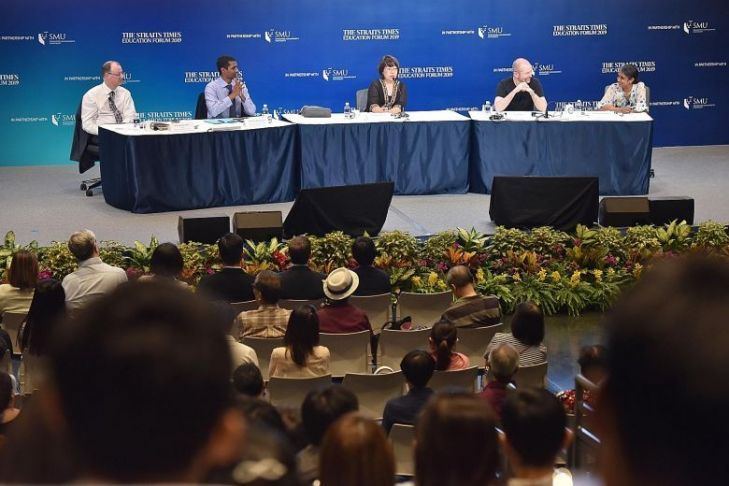
The Straits Times (ST) Education Forum, organised in partnership with the Singapore Management University (SMU), returned this year on Saturday, 6 April 2019, in the form of a debate on the motion “Entrepreneurs today do more harm than good”.
Now into its fourth edition, the ST Education Forum has become an annual signature event on the calendar of the local education landscape and was attended by about 500 principals, teachers and students from Junior Colleges and Polytechnics, parents, ST readers, SMU entrepreneurs, faculty, staff and students. The audience was asked to vote for or against the motion at the start and end of the debate. The two-hour debate did not disappoint, swinging audience votes from one side to the other.
Arguing for the motion were cyborg rights activist, Mr Aral Balkan and Ashoka Country Director for Singapore and Malaysia, Ms Sumitra Pasupathy. They locked horns over the benefits and downsides of modern day entrepreneurship with the opposition team, comprising SMU Provost Prof Timothy Clark and Reddi Kotha, SMU’s Associate Professor of Strategic Management at Lee Kong Chian School of Business. The debate was moderated by ST Opinion Editor, Ms Chua Mui Hoong.
This year’s debate speakers included representatives from Singapore’s junior colleges and polytechnic, as well as an SMU alumnus entrepreneur. Ms Stacy Lee from Catholic Junior College and Ms Eliora Joseph from National Junior College presented spirited arguments in support of the motion. Mr Chong Kok Leong, entrepreneur and graduate from Ngee Ann Polytechnic, and Ms Anna Haotanto, CEO and Founder of The New Savvy, took them on, bringing in their personal experiences to illustrate how entrepreneurs today create more value than strife.

SMU President Prof Lily Kong, in her welcome remarks, said, “Entrepreneurs today, from Alibaba’s Jack Ma to Amazon’s Jeff Bezos, and closer to home, Razer’s Min-Liang Tan, are universally celebrated. The spirit embodied by entrepreneurs typically includes passion, determination, confidence, creativity, competitiveness, a strong work ethic and strong interpersonal skills. We hope that the innovation brought by entrepreneurs create jobs, improve lives and bring benefit to society. Yet modern day entrepreneurship has a dark side to it as well, creating impact that could do more harm than good, from stifling competition, surveillance capitalism and hypercompetitive cultures leading to growing depression.
As a university, we recognise that entrepreneurship is changing the fabric of our everyday life. Entrepreneurs who have achieved cult status with their success, are influencing the way people think and behave. Through the robust arguments lined up this morning, SMU aims to contribute to deepening the awareness and understanding, of the risks and gains that modern day entrepreneurship brings.”
In focus during the Q&A segment, moderated by Ms Chua, was the issue of surveillance capitalism, in which “Big Tech” companies in Silicon Valley infringe the privacy of users by monetising data collected through their online activities. It was a close fight to decide if entrepreneurs today do indeed do more harm than good. At the conclusion of a spirited debate and colourful showdown, the team arguing for the motion edged slightly ahead of its opponent and was ultimately declared the winner, having managed to swing more votes from the audience.
This year, the half-day Forum was streamed live through ST’s Facebook page, bringing the debate to an even wider audience through the digital space. Watch the debate here.
The full story published in The Straits Times (7 April 2019) is enclosed:
Spotlight on 'people farming' at ST forum
By Sue-Ann Tan
Tech firms take heat as experts discuss good and bad sides of entrepreneurship
With every click, Facebook users share photos, videos and bits of their day with their friends.
But not many know that the information is being "farmed" and sold to other companies. This played a big part in the rigorous discussion at The Straits Times Education Forum yesterday on whether entrepreneurs today do more harm than good.
Held at the Singapore Management University (SMU) School of Law Building, it was the fourth edition of the forum organised by The Straits Times and supported by SMU. The debate was moderated by ST opinion editor Chua Mui Hoong.
Mr Aral Balkan, co-founder of Indie, a social enterprise striving for social justice in the digital age, argued that wealthy entrepreneurs these days are doing more harm because they "farm" information from users through surveillance and then sell the data. He called this "surveillance capitalism".
He said: "Facebook has two audiences - their users and their customers who pay them. They track everything that you do, store the data, analyse it continuously to create a profile of you, and monetise it with their customers... I also call this 'people farming'. They are factory farms for human beings."
Mr Balkan also cited the example of technology firm IBM, which was accused of collaborating with Nazi Germany to track concentration camps and prisoner data.
"We need to think small, to think not about growth, but about 'de-growth'. This means small technology... for the common good that is controlled by us, that respects human rights, efforts and experience and is ethically designed."
Taking his side was social entrepreneur Sumitra Pasupathy, the country head of Ashoka, a global organisation that promotes entrepreneurship for the greater good.
She said: "Businesses do harm when they're not considering the good for all."
She added that entrepreneurs should be driven by purpose, have people as the priority and be supported by policies that promote good organisations through resources and capital.
But, taking issue with the motion, SMU associate professor of strategic management Reddi Kotha said that entrepreneurs were needed for society's development. He pointed out that governments could also interfere if monopolies hindered creativity and users themselves could choose to walk away from businesses they deemed harmful.
SMU provost Timothy Clark added that entrepreneurship is about creating innovation and seeing opportunities that are not there before. Economies will also continue to shift into knowledge-intensive sectors, where entrepreneurial creativity and agility are important in generating new ideas. Although the debate began with over 70 per cent of the audience disagreeing with the motion, this shrank to 47 per cent at the end and the proposition won the argument.
The topic on entrepreneurs was chosen by The Straits Times senior education correspondent Sandra Davie.
Mr Warren Fernandez, editor-in-chief of Singapore Press Holdings' English/Malay/Tamil Media Group and editor of The Straits Times, said: "It is a provocative topic that we have chosen. It's playing out against the backdrop of what's going on out there... The tech companies have done enormous good for a lot of us but we are seeing some of the downsides at the moment, like privacy (issues)."
SMU president Lily Kong added: "I hope (these forums) contribute to thought leadership on the issues that impact society."
Ms Davie said the idea was to debate the issues surrounding modern-day entrepreneurship and to get young people to examine the issues up close.
She said: "The hope is that our future entrepreneurs will go on to develop better models that will truly benefit society."
The debate was streamed live on The Straits Times Facebook page.
*
Doing good or not?
Q: LOOKING AT ENTREPRENEURS ... CAN WE SAY THEY ARE DOING MORE HARM THAN GOOD?
A: Mr Aral Balkan: Where is the investment going and where is it coming from? If we look at the environment today, 99.9 per cent of investment is going into the mainstream model. Venture capital is funding certain types of businesses. It doesn't invest in the sustainable business, but in the sale of the business - that is where they get the money back. We talk about start-ups but I wish we could talk about stay-ups and I wish that money is going into the good businesses.
Prof Timothy Clark: We need to de-centre our understanding of entrepreneurship. We are focusing on a very small number of organisations and individuals when there are many others making contributions to society.
Q: YOU (ENTREPRENEURS) ALWAYS BEGIN ON ONE END OF THE SPECTRUM, THE "DO GOOD" SPECTRUM, BUT THERE WILL BE A SHIFT TOWARDS THE "HARM" END WHEN YOU START THINKING OF ... SCALING QUICKLY, AND WHEN YOU MEET CAPITAL PROVIDERS THAT DILUTE YOUR VALUES AS THEY DILUTE YOUR EQUITY. ENTREPRENEURS DO GOOD, CAPITAL PROVIDERS DO MORE HARM THAN GOOD.
A: Ms Sumitra Pasupathy: (My enterprise) puts purpose over profit as a priority. It is incredibly important to redirect resources towards purpose-driven organisations.
Mr Balkan: Exponential scale does not end well in a finite system, but we can scale organically and horizontally if the idea is not to concentrate wealth and power in the hands of very few.
Source: The Straits Times © Singapore Press Holdings Limited. Permission required for reproduction.


